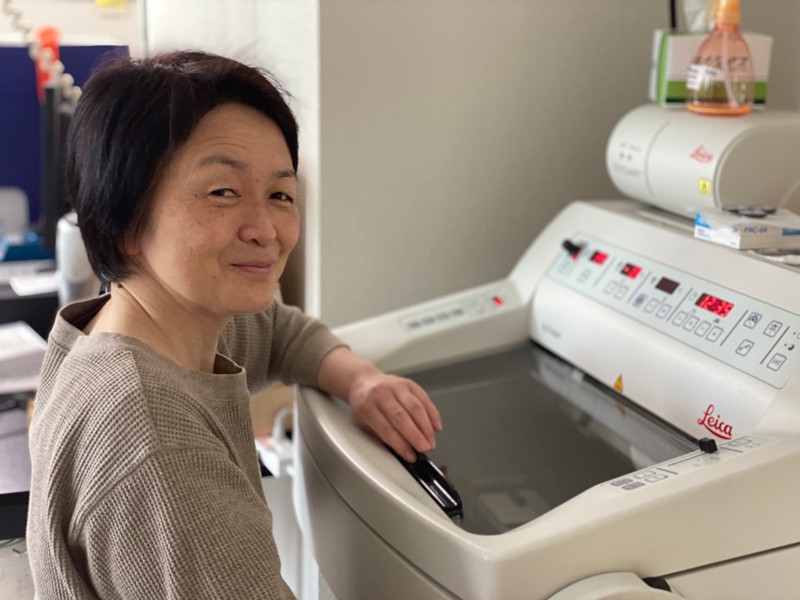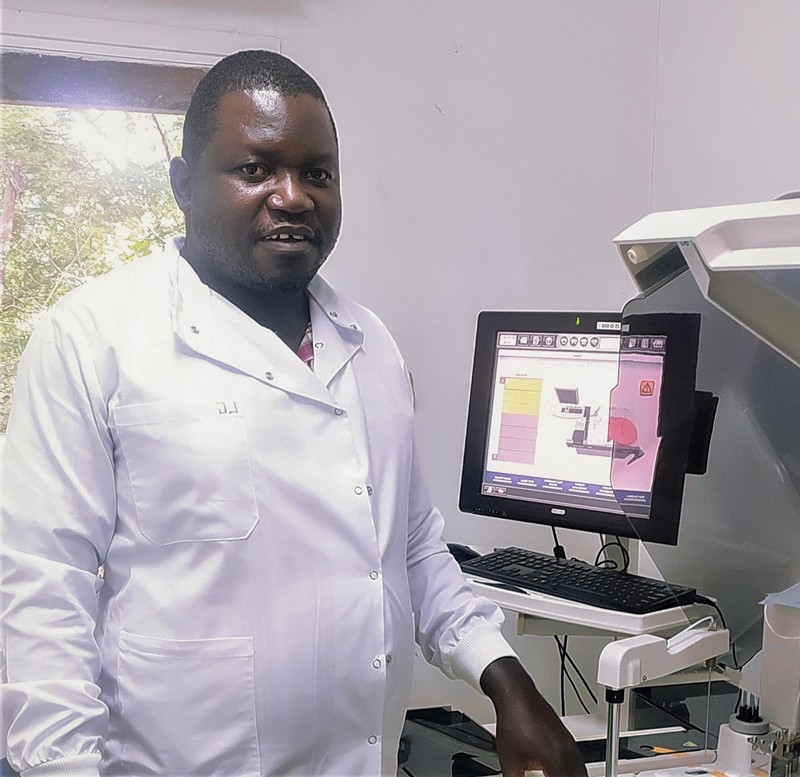Research technicians and laboratory managers are important for keeping scientific research moving forward. They collect data, oversee budgets and supplies, and manage research teams. Yet, these positions aren’t always recognized as long-term career options and individuals in these roles often lack the resources and support needed to develop their own careers. Nature talked to six technicians and lab managers about how they continue to make progress towards their goals and what lab leaders and institutions can do to support them.
TAKAKO KEIDA: Consider your personal life
Laboratory technician at Kumamoto University in Kumamoto, Japan.
In the early years of secondary school, I enjoyed doing science experiments, so I wanted to become a pharmacist or a clinical laboratory technician. After considering the tuition and living expenses needed to go to pharmacy school, I decided on the technician route. As the daughter of divorced parents who was bought up by my aunt because neither parent had the financial resources to do so, I wanted a stable job that paid enough for me to lead an independent life and provide for my family.
I started working as a laboratory technician at Kumamoto University in December 1998 and have worked in four labs there since then. My role as a technician is to support researchers by helping them with various protocols, such as genotyping genetically modified mice. I love the sense of accomplishment that comes with producing results in cooperation with researchers.
I was also able to earn my bachelor’s degree while working as a technician. My boss at the time, cell biologist Toshio Suda, told me that improving technicians leads to improved research. He helped me and the assistant professor who was supporting me at the time to turn my research into a thesis, which was needed for my degree.
The environment for laboratory technicians has been great, not only to support my career goals, but also for raising my three children, who are now adults. Many researchers at the university have lived abroad, so they have flexible attitudes toward women who are raising children and working at the same time. I didn’t have to worry about or feel guilty for taking leave when my child was sick or to attend school events. I could also adjust my work schedule as long as I achieved results during the overall project, so it was easier and less stressful to balance work and childcare.
I am grateful for the university environment, when I see my children who are now able to dedicate themselves to society. Although I have been working at the university for a long time, the atmosphere has remained the same.
JACQUELYN MOUNTCASTLE: Advocate for yourself
Staff research associate at the University of California, Los Angeles.
As a molecular-biology technician, I do a lot of genomic sequencing of native amphibians, reptiles and plant species in Los Angeles, California. I started my current position about six months ago, but worked as a technician for 4.5 years before that in a lab at Rockefeller University in New York City sequencing the genomes of vertebrate species.
In my previous lab, I felt like I got to a point at which I couldn’t grow in the way I wanted to, in part because there wasn’t a management position available for me to be promoted into. I also wanted to explore more applied research. I decided to join a lab at the University of California, Los Angeles, because it worked directly with local and state governments to inform conservation efforts.
I’m still not quite sure of my career path from here. I can’t afford to go back to university for a PhD and I don’t want to focus on a single research project, but there aren’t a lot of options for people in my position to understand where to go next. To help me navigate my options, I reached out to other researchers I worked with but who were outside my lab. They helped me to weigh up the pros and cons of getting a PhD and offered perspectives on working in industry and federal agencies. About four months ago, I started working with a career coach, who helped me to identify jobs that align with my values, skills and passion for science. This has been a tremendous experience and I now have a clearer path forward than I ever had before, but it is a very expensive resource that isn’t accessible for everyone.
I wish there were more mentorship services available for research technicians, but I have learnt that it’s important to advocate for yourself to ensure that you get the opportunities you need to progress in your career. As a tech, it can be difficult to approach a supervisor about new opportunities and advocate for your career growth. But during my interview, I asked for the experiences that I wanted and communicated the skills I gained during my master’s degree in public health to ensure that I would be compensated fairly.
We need to create more supportive environments in which technicians feel valued, because that’s going to determine whether somebody stays or leaves. Lab leaders should not view technicians as just being there to pipette and go home. They should make sure that technicians feel comfortable and supported in developing their careers. Often, it feels like people view these positions as temporary roles that can be filled by undergraduates who need lab experience. But there are so many people who would like to stay in these positions for longer time periods and contribute to research in their own way.
LOUIS BANDA: Find your purpose
Lab manager for the Malawi Epidemiology and Intervention Research Unit in Karonga, Malawi.
I grew up in central Malawi and joined the Malawi Epidemiology and Intervention Research Unit (MEIRU) in Karonga in 2007. MEIRU is a research organization that was started in 1979 to study individuals with leprosy. It has since expanded to conduct population studies on tuberculosis, HIV and COVID-19.
I started off as a lab technician, but always felt the need to improve myself and reach a position where I could make decisions. That inspired me to become an assistant lab manager and then the lab manager. As a technician, I worked mostly at the bench running tests on stool, blood and urine samples for various research projects. Now, I set budgets for the lab, procure reagents and consumables and manage ten assistants and technicians. I interact with a variety of people, including study leaders, a data-management team and field researchers.
Over the past 15 years, I’ve learnt that I need to understand the requirements of each researcher and project to ensure that I execute studies correctly. Lab managers constantly need to update their knowledge base about the latest technologies and procedures, which can be challenging because research is so dynamic. I read a lot of scientific literature and regularly ask the researchers I work with about the equipment and protocols they use or would like to use.
Although lab technicians and managers are involved in research, our contributions aren’t always recognized. I’d love to lead a study about a research question I’m interested in and be first author on more scientific publications, but what keeps me motivated is the impact that I’ve had on people in Malawi. A lot of people have received diagnoses and treatments because of my work at MEIRU — that’s why I’ve stayed there for so long. My advice for other lab managers is to make sure that you’re benefiting other people in your community, country or region.
DEVIN LAKE: Expand your network by helping others
Lab manager and PhD student at Michigan State University in East Lansing, Michigan.
I worked as a paid laboratory technician in my current lab as an undergraduate student. During the academic year, I worked about 30 hours a week and during the summer, I worked full time. The lab was like a second home for me. When I graduated, my supervisor offered to pay for my PhD if I took on the role of lab manager. Both positions benefit from me knowing what everyone else in the lab is doing, but that’s about the only overlap. Most of my responsibilities and even my relationship with my PhD adviser differ depending on which hat I have on at the time.
As a lab manager, my main responsibility is to keep track of the undergraduate lab techs who maintain media to grow bacteria, clean and prep glassware and sterilize equipment. I train them on lab techniques, and I give them advice on navigating university and their career paths. I order equipment, make sure everyone’s safety trainings are up to date and occasionally do lab work.
When I applied for graduate school, I wanted to become a professor, but managing the lab helped me realize I would much rather do this as my career. I get so much joy out of mentoring the undergraduates and helping everyone else’s research projects come to fruition.
One of the toughest parts is finding a new lab-manager position when I finish my PhD and my adviser retires. I have to find either a new professor who needs help starting their research programme or an established scientist who needs help organizing their lab and can afford to hire a manager. I have my foot in 18 doors and am just waiting until someone says they’ve got a position available.
Thankfully, my current lab has a huge network, and many alumni have started their own labs. New professors ask me questions about different protocols and what their lab managers need to know. In June, I’m going to Texas to train a new lab manager on how to conduct experiments that we’ve been doing in our lab for more than 30 years. Having people come to me for help and guidance has provided opportunities for me to continue working in this role.
ELAINE FITZCHARLES: Invest in training opportunities
Senior lab manager at the British Antarctic Survey in Cambridge, UK.
I’ve always liked the practical side of making equipment work, which is why becoming a lab manager was probably the right decision for me. I’ve been at the British Antarctic Survey (BAS) since 2003, starting as a genomics technician and growing into the senior lab manager role I have today. I now oversee all of the BAS labs, including six research stations, a research ship and five laboratory suites in Cambridge.
Some days I am in constant meetings with people across the organization. Other days, I’m moving boxes, picking up orders and checking budgets. I also work with nine lab managers, so I get the team together so we can keep up to date with what people are up to and support each other.
Along with the day-to-day lab operations, I have to think about how to develop new facilities and upgrade technologies for future research projects. People in technical and lab-management roles are often looking at what’s coming next across a range of scientific disciplines. I have to understand areas of science beyond my own background in marine biology and listen to people’s goals for their research programmes.
Being a lab manager is about managing people as well as equipment and facilities. One of my biggest challenges is balancing the needs of different people and trying to decide who gets priority, because we have limited funds, and we need to make sure they go to the right place. Part of my role is making sure everybody’s voice is heard and that I’m not just listening to the person who speaks the loudest.
You also need the right scientific skill set and personality to be a lab manager or technician, so I continue to invest in training opportunities to develop my capabilities. I’ve taken courses about understanding different personality types and how to have challenging conversations. I go to conferences and speak to people who are in similar roles. For instance, the Institute of Safety in Technology and Research in London hosts an annual conference, and the members e-mail group is a fantastic support network for advice on any lab management issue. The Institute of Science & Technology in Sheffield, UK, also has an annual conference that is very much aimed at the technician community and support for career development.
Becoming a lab manager is very much a career choice that I wish received the same recognition as becoming a research scientist. I had considered moving into a postdoc position and going down the researcher route, but there’s a stability to lab-management positions, in part because you don’t have to chase down grant funding. These roles require a different skill set from research positions, but still need a high level of knowledge and expertise.
CATHERINE TUCKEY: Level up professionally
Professional registration specialist for the Royal Society of Chemistry and project lead of the Technician Commitment initiative in Nottingham, UK.
I manage applications to become registered science technicians and scientists that come to the Royal Society of Chemistry (RSC) in Cambridge, UK. These designations are managed by the Science Council, a UK membership organization for professional scientific bodies, and are public awards honouring someone’s skills and expertise in a professional setting. For instance, chemistry technicians must showcase their scientific knowledge as well as their skills in communication and teamwork to be eligible for registration.
As a publisher, the RSC is keen to support authorship for technicians on research papers to acknowledge their contributions. It also has funds to support technicians who want to run outreach or public-engagement events.
Sometimes technicians don’t feel empowered to fight for themselves and raise their profile, but engaging in career-development opportunities can help them to build confidence. The RSC has grants specifically for technicians to develop their careers. It also funds members to undertake training courses or attend networking events, including any associated travel costs, and has a larger grant available to fund extended placements for technicians.
My advice for current and potential research technicians is to become members of a professional body. The RSC has a wealth of knowledge and a careers team that offers impartial advice, one-to-one consultations and webinars on various career paths. If you’re working within a scientific field, ask technicians in your lab or department about their roles and the support resources that are available to them.
My advice for supervisors and lab managers is to take the time to understand exactly what a technician does on a daily basis, because that will allow them to tailor development opportunities to the specific needs of their staff.



